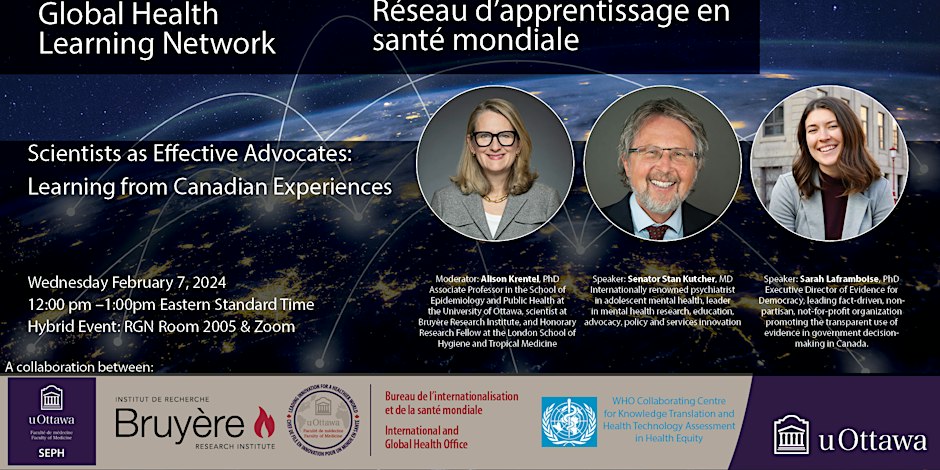Session’ Details: This enriching session will explore how scientists can be effective advocates by hearing about and learning from Canadian experiences in advocacy in national and international domains. The session will explore the unique challenges and opportunities facing scientist advocates. Speakers will share their lessons learnt, will highlight tools and will refer to a recently published guide from Evidence for Democracy: An Essential Guide to Science Advocacy – Evidence For Democracy.

General Information:
Topic: Scientists as Effective Advocates: Learning from Canadian Experiences.
Speakers: Senator Stan Kutcher and Ms. Sarah Laframboise
Moderator: Dr. Alison Krentel
Date: February 7, 2024
Time: 12 p.m. to 1 p.m. (Eastern Standard Time)
Format: Hybrid
Language: English
Location: RGN room 2005 or Zoom.
Refreshments will be served and sponsored by the Canadian Network for Neglected Tropical Diseases.
Speakers: Senator Stan Kutcher, Ms. Sarah Laframboise PhD (c)
Senator Stan Kutcher
Senator Stan Kutcher is an internationally renowned psychiatrist in adolescent mental health. He is a leader in mental health research, education, advocacy, policy and services innovation. He previously worked at the University of Toronto and Dalhousie University where he was the Department Head of Psychiatry, the Associate Dean of International Health and the Sun Life Financial Chair in Adolescent Mental Health. Senator Kutcher and his team at Dalhousie University led the development of a national child and youth mental health framework for Canada (Evergreen). He has conducted award winning research into the neurobiology and treatments of mental disorders in young people and has developed and deployed innovative systems of mental health care nationally and internationally. Recently his focus was on primary care mental health interventions, mental health literacy development in school systems and in postsecondary institutions. Ensuring that the best available evidence is used to advance mental health and enable rapid access to effective mental health care is essential to all of Senator Kutcher’s initiatives.
Ms. Sarah Laframboise PhD (c)
Sarah Laframboise is the Executive Director of Evidence for Democracy, leading fact-driven, non-partisan, not-for-profit organization promoting the transparent use of evidence in government decision-making in Canada. While completing her PhD in Biochemistry at the University of Ottawa, Sarah served as the President of her Graduate Student Association and founded the Ottawa Science Policy Network, a student-run club at the University of Ottawa. Over the last two years, Sarah has led as Executive Director of the Support Our Science Campaign which has been advocating for increased funding to graduate students and postdocs in Canada. She was also recently named to Canada’s Chief Science Advisor’s Youth Council, and is a long-time volunteer and staff at the Canadian Science Policy Centre. Sarah has nearly a decade of experiences in science communication, policy, and advocacy.
Moderator: Dr. Alison Krentel
Dr. Alison Krentel completed her postgraduate studies at the London School of Hygiene and Tropical Medicine receiving her PhD in Public Health (2008) and her MSc in Public Health in Developing Countries (1999). She is an Associate Professor in the School of Epidemiology and Public Health at the University of Ottawa, a Senior Scientist at the Bruyère Research Institute, and a Senior Research Fellow at the WHO Collaborating Centre for Knowledge Translation, Technology Assessment for Health Equity. Alison is one of the founding members and current chair of the Canadian Network for Neglected Tropical Diseases (www.cnntd.org). Dr. Krentel’s areas of research interest and expertise involves understanding and facilitating community acceptance of new health initiatives for the control and elimination of infectious diseases, specifically neglected tropical diseases and the use of implementation research to improve the equity and effectiveness of health interventions. (thethreadslab.org)
About the Global Health Learning Network: The Global Health Learning Network is a platform for knowledge growth and exchange with the goal to build a community of practice in global health that reaches across researchers, practitioners, and learners from all global health domains to include members of the public with an interest in global health. The School of Epidemiology and Public Health, Bruyère Research Institute, WHO Collaborating Centre for Knowledge Translation and Health Technology Assessment in Health Equity, and the International and Global Health Office (IGHO) are collaborating to host this monthly global health seminar.
